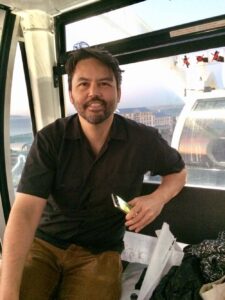What are you researching?
Like many friends and colleagues, I feel like I am working on too much! I’ve been catching up writing book reviews, chapters, and other sundry items this year. But the main project I am currently working on is a cultural history of the nighttime in South Africa during the 19th and 20th centuries. It’s a big project, one that I won’t complete for several more years. But I’ve been going through archives, memoirs, newspapers, novels, photographs, and poetry to piece together this history. I am looking at both how people experienced the nighttime as such, as well as the ways in which the nighttime has been described and drawn upon metaphorically to depict times of difficulty. The night has a Biblical quality, in addition to being an actual time of day. It is a time of freedom and danger, culture and curfews, socializing, and police raids. The night has a complicated legacy in South Africa, and it casts new light, if you will, on its fraught history.
Where have you been calling home?
I had a residential fellowship at the Stellenbosch Institute for Advanced Study, which is modeled after the Institute for Advanced Study at Princeton. It is connected to Stellenbosch University, which is in the greater Cape Town area. I was there for six months from July to December 2019. I then spent two months this past spring as an environmental humanities fellow at the Institute for Advanced Study in the Humanities at Edinburgh University—an entirely different context. My stay was supposed to be for four months but was unfortunately cut short by COVID.
What was life like in South Africa?
I love South Africa. It’s my second country; I first went in 1995. I should add, too, that despite being on sabbatical, I co-led a group of 19 Lafayette students to South Africa in January as part of a new interim program. William Bissell, a professor of anthropology at Lafayette, served as co-leader. We had an awesome time introducing students to Cape Town, Johannesburg, and places in between.
How will you use these experiences in your teaching?
Everything goes into teaching: research, talking with new colleagues, catching up on reading. Sabbaticals are so important in order to restore the mind and gain perspective. And in my opinion, they are even more enriching when they are off campus, in order to meet new colleagues, reconnect with old ones, and see new parts of the world. I had a chance to get to know a number of scholars I wouldn’t have met otherwise, which has given me a lot of ideas about what to teach and assign this next year.
What scholarship will come from the fellowships?
Well, I love to write, and I wanted to be a writer from a very young age. It’s one of the main ways I interact with the world. I grew up cherishing books and still do. I’ve published five books, and each is different. I try to challenge myself by working on different subjects and in different genres. So the nighttime project will be a book. And other books will follow.
Lastly, tell us about a recent honor your work has received, as well as your appointment to the Royal Historical Society.
Yes, my book A Soviet Journey: A Critical Annotated Edition (2017) was a finalist last November for the Paul Hair Prize, given by the African Studies Association for best work in historical primary sources. I also became an Elected Fellow of the Royal Historical Society this past December. It is by nomination and written recommendation by current members of the RHS, so I was honored by this. I have a number of friends and colleagues in the UK, so I am glad to be more closely connected to the academic community there.
 Christopher Lee, associate professor of history, has academic interests that include modern Africa, southern Africa, Indian Ocean studies, Cold War history, historical anthropology, Afro-Asianism, and Black political thought. He talks about his recent studies in South Africa and Scotland, his teaching, and his scholarship.
Christopher Lee, associate professor of history, has academic interests that include modern Africa, southern Africa, Indian Ocean studies, Cold War history, historical anthropology, Afro-Asianism, and Black political thought. He talks about his recent studies in South Africa and Scotland, his teaching, and his scholarship.